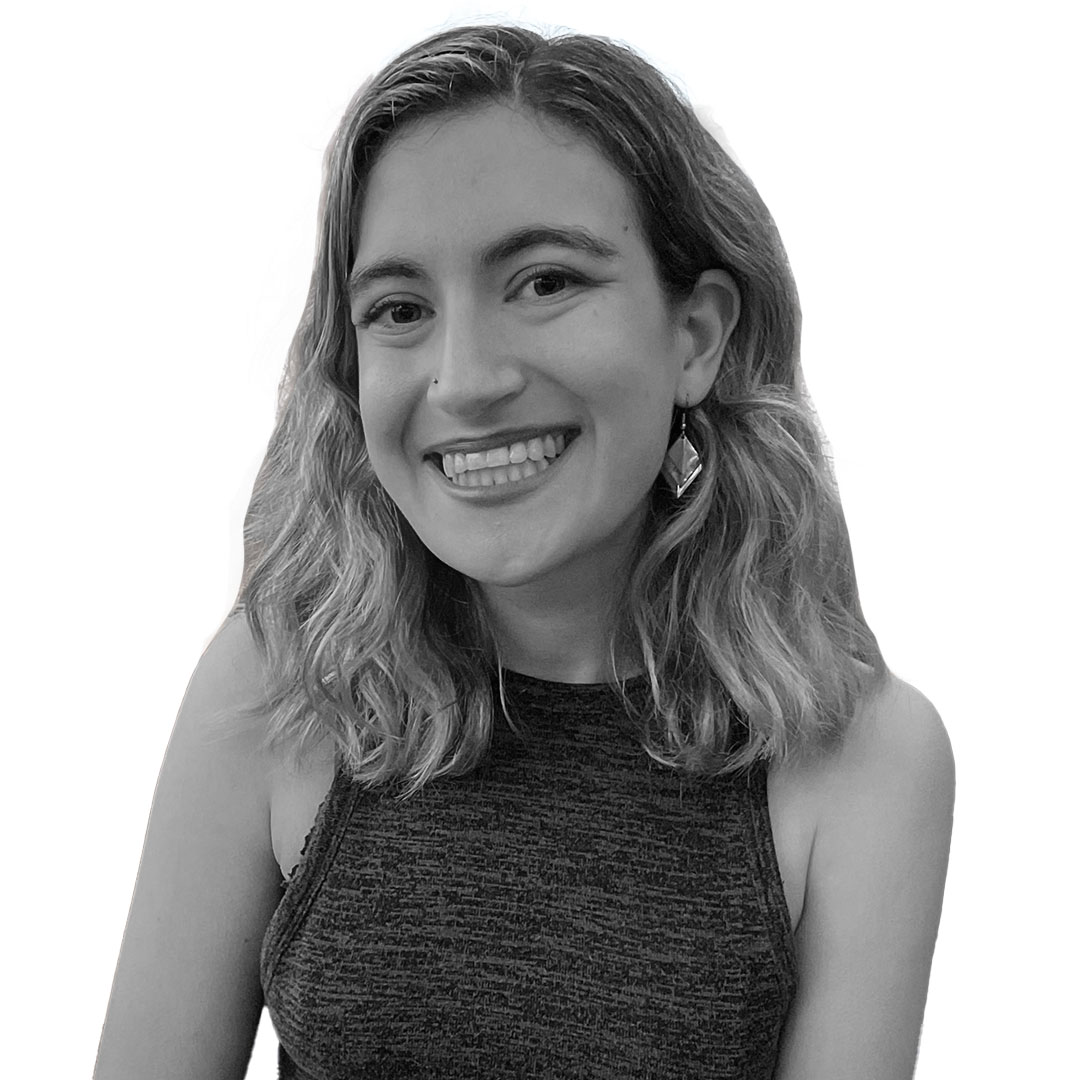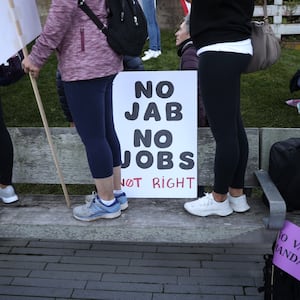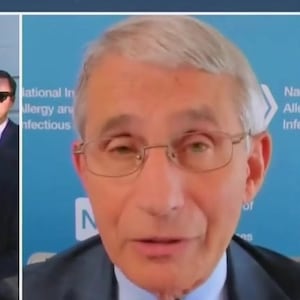Hundreds of his TikTok videos begin the same way: “Hey everybody, it’s Pax, your favorite field epidemiologist.” Tyler Hardy, using the handle @snackpax.epi, will then provide an overview of weekly COVID-19 cases and deaths around the world, explain what new variants are emerging, or unpack recent developments about vaccines and boosters. He often uses a color rating system—the “Pax Panic Scale”—to tell his audience how much to worry about certain public health threats.
This summer, over a year after he’d started making content on the platform, Hardy amassed a following of nearly 170,000 accounts, plus almost 3 million likes on his videos. He was interviewed in news articles as a public health expert, and his career started catapulting to new heights.
Everything seemed to be coming up Pax—until he became entrapped by his own web of lies.
“He pulled the wool over my eyes for sure,” Jess, a registered nurse who requested to go by her first name to avoid internet harassment, and who posts on TikTok as @Jesss2019, told The Daily Beast. “I felt horrific about the situation, but with trusted medical professionals, I guess it’s not the first thought that comes to mind. I’ve been in this profession for over seven years, and I’ve never encountered something like that.”
The Pax saga began last month when Savannah Sparks, a lactation consultant and pharmacist, raised questions about Hardy’s scientific credentials based on tips she had received. Sparks’ first video pointed out that Hardy had paid for Twitter Blue while claiming to have been verified as a notable person; it went on to reveal that Hardy had artfully redacted the name associated with an addiction counselor and clinical social worker’s licenses to make them appear as his own.
“You need to answer to why you lied about having certifications that you don’t have, and actually tried to take the certification… of a Black woman,” Sparks said in her video.
Hardy initially denied the allegations and deflected, including by showing a diploma from Columbia Southern University—which offers an online master of public health degree—and obscuring the word “Southern” with his hand (ostensibly to make the degree look like it was from Columbia University). But in a series of videos posted from late November onwards, he admitted that many of the accusations were true—he was not a field epidemiologist with a decade of experience. He lied about undergraduate and graduate degrees, and fabricated professional certifications. For much of the time he was posting videos as a COVID expert, it seems, he had no degrees or professional experience in public health.
In the weeks that followed these revelations, Hardy lost almost 8,000 followers (yet still has 162,000 as of mid-December.) A prestigious UN-backed initiative that he belonged to dropped him from its roster, and other epidemiology TikTokers have distanced themselves from him. And, worst of all, records show that he has been charged with two felony crimes stemming from his fraud and is set to appear in court later this month.
In an email to The Daily Beast sent after this story was first published, Hardy disputed how many of the claims against him are characterized. “Whereas, I do admit there were lies, I did not lie about everything,” he said, adding that he does not feel he misrepresented himself to either his followers or the U.N.-backed initiative.
Hardy’s grift might seem like an anomaly. But in reality, it’s only one particularly egregious case of a much deeper and insidious problem when it comes to COVID-19: Since the start of the pandemic, there’s been a rift between those who we think of as “experts” and those who actually deserve to be. These science grifters need not be bad actors, necessarily; instead, they take advantage of news and social media’s inability (or unwillingness) to vet them. Without any framework for how we decide who’s a trusted expert on COVID and who isn’t, we’ll keep getting duped.
“This is probably the most overdue story in the entire pandemic,” Michael Osterholm, the director of the University of Minnesota’s Center for Infectious Disease Research, told The Daily Beast. “I think the media has done largely a very poor job of screening out its experts, and no one’s been held accountable.”
Almost Famous
Hardy’s earliest public posts on TikTok, from April 2021, bore few similarities to his eventual self-styling as a COVID-19 expert. These posts consisted of short, ironic videos about relatable themes from the account @paxtonvecchia. “1.5 seconds into my coworkers complaining about Everything” reads the caption of one in which Hardy lip syncs to the chorus of a P!NK song. Most of these videos have only been viewed a few hundred times.
Hardy posted for the first time about being an epidemiologist in July 2021, using a popular audio to answer tongue-in-cheek “Questions I get asked as an Epidemiologist” (onscreen text goes on to clarify that he does not fill prescriptions, nor is he a dermatologist.) In his next video, he acted out a scene he claims happened in real life, in which he secures antiretroviral drugs to treat HIV for a “former client.” He captioned it, “It’s not always this easy, but I don’t mind the challenge. #wellness #paxtonvecchia #comedy #fypシ #publichealth.” That post blew up, amassing almost 600,000 views.
Over the next month, Hardy’s new online persona as Pax the field epidemiologist took shape, and he started posting about COVID-19. Pax, he claimed, had attended New York University and Columbia University; he had investigated food-borne illnesses and worked for the Centers for Disease Control and Prevention; he had 15 years of public health experience and training in biostatistics; he had taken the MCAT and scored in the 97th percentile. He became a prominent figure on “epi TikTok,” and was even once interviewed as a COVID expert by USA Today for a story on applying the lessons learned from HIV to fight the COVID-19 pandemic. The article, published as part of a special Pride Month issue, refers to him as “an epidemiologist with the Colorado Department of Public Health” who has worked on Colorado’s COVID response team “but has devoted most of his career to HIV/AIDS treatment and prevention.”
Over time, Hardy’s tone shifted from comedic to didactic, and he began to record videos sharing his “insight” on other health news, like the mpox virus (formerly monkeypox).
Some of Hardy’s appeal to viewers may have been his willingness to share specific, thrilling details about his job and act out bizarre stories in videos, only some of which were explicitly labeled as satire. Pax busted meth labs, reprimanded contact tracers for sharing phony COVID-19 treatments, and conducted outbreak investigations for rare pathogens. In other words, he was like a real-life superhero.
He also shared content about his own mental health, including a video where he divulged being diagnosed with histrionic personality disorder: “That just means I’m uncomfortable not being the center of attention,” he explained.
At the recommendation of Jess, he applied and was accepted to Team Halo, a United Nations Verified Initiative formed during the pandemic to bring together and amplify COVID-19 vaccine experts. As one of its members, he was featured on its website and afforded an informal “verification” as a trusted expert. Jess, who is still a part of Team Halo, said that in retrospect, the hardest part to stomach was feeling like she’d known Pax—messaging with him through the app and going live on numerous occasions—when he’d been deceiving her all along.
“We’re used to fighting myths and disinformation—we’re used to fighting people who are going against us, and Pax was with us,” she said.
A Short History of Pandemic Grifting
How on earth did a UN-backed initiative designed to assemble COVID experts let in a grifter? Expertise, interviews with researchers reveal, is a concept that appears well-defined only at a distance; the closer one approaches it, the blurrier its edges become. And these boundaries were especially murky at the start of the COVID-19 pandemic, a situation where the public and media heavily relied on experts to tell them what to do and how to protect themselves, said Andrea Lavazza, a neuroethicist at Centro Universitario Internazionale in Italy.
“Many experts in medicine needed to dive into a new situation” at the start of the pandemic, even if they had experience in pandemic preparedness and response, Lavazza told The Daily Beast. “So, in a sense, I think no one was really a COVID-19 expert.” In Italy, he said, certain doctors featured on cable news did not always have the best scientific credentials; rather, they made incendiary statements or sparked conversation in a way that made for easy headlines.
A similar cycle played out in the U.S. on social media. One now-infamous example of it occurred in January 2020, when epidemiologist Eric Feigl-Ding posted a COVID-19 Twitter thread that began: “HOLY MOTHER OF GOD.” That “tweet heard round the world” provoked immediate backlash from many other academics and researchers as inaccurate fearmongering. These scientists called into question Feigl-Ding’s experience in epidemiology, which had mainly consisted of research on nutrition and cancer—not infectious disease. In spite of these criticisms, this tweet and others that followed spurred hundreds of thousands to follow Feigl-Ding, and he began to regularly appear in the media.
“There’s a lot of people who, in a sense, have no real epidemiology experience, but have suddenly become experts on the epidemiologic aspects of the pandemic,” said Osterholm. Even though he declines interviews when the focus is outside his realm of expertise, he said that many others do not—and so those with less direct expertise and who make the boldest claims often get the most airtime.
And of course, even well-intentioned experts get caught up in the pressure to speculate and “go well beyond your lane,” said David Abramson, a social and behavioral sciences researcher at NYU’s School of Global Public Health.
“It’s quite a thicket,” Abramson told The Daily Beast, referring to today’s media ecosystem. “It makes you realize that how we think of expertise itself is indistinct and nebulous and is not as hard and fixed as we would all like to believe it is.”
As weak as fact-checking has become in traditional media—enough to let an incoming member of Congress lie extensively on his resume—it’s vastly weaker on social media, and much more variable between platforms. Abramson points out that people often afford posts from different sites and users with the same degree of trust, regardless of whether the World Health Organization or an antivaxxer posted it.
Whether it’s honest experts overstepping, or grifters intentionally posing as experts, the result is the “further diminishment of trust overall, because people who read that will then mistrust other sources and maybe more reputable sources,” Abramson said. “There’ll be a point where it seems like anything could be true, so you can’t trust anything.”
Downfall
Hardy took down several videos he posted after Sparks’ initial accusations, including the “Columbia 💅🏻 University” video, as some have termed it. Meanwhile, Sparks undertook an investigation of her own, filing public records requests regarding Hardy’s alleged employment at state public health departments in Colorado and California.
The documents Sparks received, along with others obtained by The Daily Beast as well as Hardy’s own admissions, tell a very different story than the one he pushed as Pax. Hardy graduated high school in 2001 and attended Metropolitan State University of Denver. A 2012 graduation pamphlet from MSU Denver lists Hardy as a candidate in sociology and anthropology (in an email, Hardy told The Daily Beast that his undergraduate degree is in behavioral science with a biology minor). The transcript that he held up alongside his diploma from Columbia Southern University appears to show that he graduated from its online MPH program in August 2022—a year after he’d spoken in videos about having the degree from Columbia University.
Sparks’ records request to the Colorado Department of Public Health and Environment confirmed that Hardy was employed as a sexual health services provider from June until November of 2022, but other public health positions with Rhode Island and California’s public health departments could not be confirmed. Although he listed these on his resume and posted, Hardy confirmed in an email that he did not work for the states of Rhode Island or California. In fact, during the dates that Hardy’s resume listed him as working at the California Department of Public Health, Hardy is photographed and named as a Reprographic Services Association Young Professional (reprographics is a field encompassing photocopying, printing, and scanning.)
Despite registering a National Provider Identifier in December that lists certifications for addiction and chemical dependency counseling in Colorado, Oregon, and Texas, only a certification as an alcohol and drug counselor could be found by searching Hardy’s name in state licensing databases—this certification was also granted this December, contradicting previous statements Hardy has made.
A search of Colorado’s court docket reveals two hearings scheduled later this month for Hardy. Records obtained by Sparks for El Paso County District Court appear to show that Hardy was charged on November 15 with two class 6 felonies for criminal impersonation and impersonating a medical provider.
“I’m glad this is finally getting traction,” Sparks told The Daily Beast in a statement, adding that when she initially broke the story, she was met with criticism from other creators for her brash approach. “Despite the continued tone policing and harassment from colleagues and enemies alike, I will always be proud of myself for claiming space as a woman in this genre of investigative journalism.”
In November, Hardy was removed from Team Halo’s website. In an email, Team Halo representatives told The Daily Beast: “TJ Pax Hardy (snackpax.epi) has been removed from the network, following unresolved questions about qualification claims he's made online…. Protecting the integrity and safety of the Team Halo network is of the utmost importance to us. We take very seriously any claims of mis or disinformation and will be reviewing our vetting process to ensure it is robust enough to withstand attempts of falsification.”
Two Steps Forward, Three Steps Back
Just as the roots of false expertise can be complicated, so too are solutions. Nonpartisan organizations like Team Halo that vet expertise on social media sound like a great idea, until a grifter slips through the cracks and damages the credibility of the effort. Clearly, such an organization needs to do a better job at evaluating its experts, whether through traditional background checks or other forms of fact-checking one’s claims and experience.
Traditional news media, especially cable television, should also reassess how it vets expertise and communicates its process to the public. Lavazza, for instance, joked that he would like to see a scientist’s impact factor—a measurement of how often others cite their work—mentioned or shown along with their appearance. But, he admits, impact factor isn’t a perfect way to calculate a researcher’s importance or expertise and feeds into science’s dangerous “publish or perish” paradigm.
Those interviewed agreed that there must be a bare minimum of accountability from both the experts and the media outlets that platform them.
“There have been groups who put models out month after month that have been so wrong so many times that if you’d bet against them in Vegas, you would have taken down the house,” Osterholm said. “I think it would be really helpful for the media to have some criteria upon which to look back and evaluate, ‘How did our experts perform? Were they really experts or not?’”
But on the flip side, letting the public scrutinize your credentials can raise unintended privacy risks. Because of the Pax scandal, Jess said that she feels some TikTok users don’t trust that she and other public health creators are who they say they are. The online vitriol against COVID-19 experts—which can rise to the level of stalking, harassment to their workplace, and dangerous threats—has led many, including Jess, to want to keep personal information off of social media.
“Many of us don’t want to share our personal credentials for safety reasons, but then it looks like we’re hiding something,” she said. “That’s where the situation lies now. It’s just very disappointing.”
Posting Through It
It would be easy to assume that since these accusations have come to light, and amid his ongoing legal drama, Hardy would have taken a break from posting on TikTok. But this would be an incorrect presumption: Hardy’s account is as active as ever. He posted a screenshot of an email he allegedly sent to Colorado licensing officials apologizing for impersonating a medical professional, using a sound titled “Sad Emotional Piano.” In another video, he directed an apology to Team Halo: “I damaged the credibility, reputation, and work that we’ve put in…. Team Halo was the honor of a lifetime,” he said.
It has fallen to the creators who bolstered Hardy’s credibility to pick up the pieces of the mess he’s made. Jess said that the whole debacle has left her “emotionally drained.”
“It's very disturbing to me that he still has a following and people supporting him,” she said.
Predictably, Hardy has a different take on the whole saga. “Do I feel that I exacerbated mistrust in the medical community? There is absolutely no way that I have made this worse. Not once have I seen COVID-19 cases rising due to fake TikTok epidemiologist [sic],” he said. “The only reason this continues is because it is good for views.”
That, at least, seems to be true. He has managed to turn the entire saga, including his arrest, into content: For several weeks, his TikTok bio read “Former favorite field epidemiologist, now felon. Working hard to make it right.” In a recent video, he even joked to viewers about wearing a special shirt for his mugshot.
And it seems all but certain that Hardy will continue to vie for the public’s attention—even as his followers implore him to quit. He told The Daily Beast he plans to continue posting “educational content” on social media. “People have called me the best, and that I was brilliant,” he said. “So I will continue to inform people as best I can as Tyler. I have lost more than anyone will ever comprehend.”
“Stop telling me to get off the internet,” he said in a recent video. “It’s never going to happen.”
This story has been updated with comments from Tyler Hardy and Savannah Sparks.









